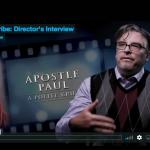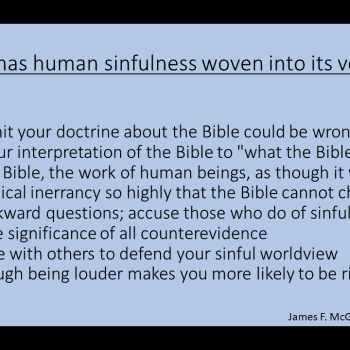I am really delighted to have had the chance to watch the first three episodes of the brand new CBS series “Living Biblically” and then to talk with the show’s executive producer Patrick Walsh about it. Readers of this blog will know that I am a big fan of A. J. Jacobs’ book The Year of Living Biblically. This series is indeed an attempt to turn that non-fiction diary, an attempt by the author to follow the Bible literally over the course of year, into a TV series in the sitcom genre. The result will air on CBS starting this coming Monday, February 26th, at 9:30pm EST. While my initial glimpses via the promotional clips had me skeptical, watching the first three episodes in their entirety poises me to encourage readers of the blog to watch the show, regardless whether the promotional clips have caused you to respond with eagerness to watch it or have made you wonder whether it is worth your time. It is – and in this blog post I’ll seek to explain why.
The fictional world of the show has direct connections not only with Jacobs’ book, but with the experience of the producers, who brought in a Catholic priest and a Jewish rabbi as consultants much as Chip, the main character, does on his journey. And their reaction to the idea of someone trying to live “100% literally” by the Bible is not unlike that of their parallel characters in the world of the show: the idea is laughable, but not in a harsh mocking way, but in the politely amused manner that those of us who study the Bible academically for a living might also scoff at the suggestion, because we know just how many points of disconnect there are between our modern life and understanding on the one hand, and the specific commands of Biblical law and its teachings about the world on the other; but also because we know how frequently the Bible reflects multiple views and perspectives and so provides a multiplicity of teachings which cannot all be easily harmonized into a single framework which might then be adhered to literally and consistently.
Part of the impetus for the show came from Johnny Galecki of The Big Bang Theory (you may know him as Leonard Hofstadter, but he is involved in the current project as a producer). He wanted to do a show about religion, and there had been no comedy on the topic for ages. Patrick Walsh, the executive producer that I had the chance to chat with on the phone about the show, comes from a Catholic background, and that was something that I was eager to talk with him about, since the show may be perceived one way by Catholic, Jewish, and mainline Protestant viewers, and completely differently by conservative Evangelical Protestants who – despite evidence to the contrary – are persuaded that taking the Bible literally and adhering to all of it is possible (except where sin prevents us from doing so) and is no laughing matter.
On the show, the main character Chip experiences what many people in all faiths experience, namely that circumstances such as the death of a loved one or the prospect of becoming a parent drive them back to explore religion that they may have been brought up in, but which they have since neglected. In the initial episodes, Chip’s attempts to do so have a consistently positive effect – but as in real life, so I expect in the long term on the show, deciding to take literally the Bible’s injunctions such as to stone adulterers may not always be appreciated by one’s coworkers.
Abrams’ book is a diary of the author’s day to day experience, undertaken essentially as a stunt precisely for the purpose of writing the book. The producers and scriptwriters were very conscious, however, that viewers would not connect emotionally with a character who was trying to follow the Bible literally merely as a stunt. The first three episodes do introduce us to the main character’s encounter with the Bible, but never explain the precise reasons why he decides to not merely return to religion, but to follow the Bible with complete commitment, results from his experiences. But given the show’s approach to its subject matter, I expect that to be cross-examined (even if they perhaps understandably decide to allow him to return to wearing mixed fabrics without much commentary). The show seeks to give voice to a number of different perspectives, not all of which are favorable to Chip’s endeavor, while his boss is interested in it purely for its potential to sell more magazines if he writers about it than his work as a film critic could.
Executive producer Patrick Walsh said when I spoke with him that he can understand and indeed sympathize with concerns that religious believers have their faith will be mocked by anything coming out of Hollywood. He hopes that the suspicious will at least give the show a chance and watch it, rather than merely assuming what it will have to offer. The producers have been eager to treat the subject matter in a manner that is sympathetic without being uncritical, and this led to some awkward moments for producers who are used to deliberately not asking writers about their religion when hiring. But for a show like this, if the writers were to include both atheists and devout Catholics, Jews, religious skeptics, and other perspectives, there was no choice. While there are some lines (such as the one about Olive Garden) that derive directly from Jacobs’ book, most of the dialogue had to be crafted fresh, since Jacobs’ book was not created with the aim of it being turned into a sitcom in mind. Despite this transition of genre and the deliberate effort to bring people together who stereotypically would argue in a manner that ruins Thanksgiving dinner, there was surprisingly little argument among the writers. Perhaps this is because each could find a character who could give voice to their own perspective. But perhaps it was because the priest and rabbi who serve as real-life consultants on the show themselves had a good sense of humor about their own traditions as well as those of others.
The scriptwriters have populated the show with characters who will make Chip’s journey interesting. They clearly wanted to paint a realistic picture of what someone doing this would deal with (although, as in any comedy, there are plenty of moments at which realism is enjoyably sacrificed for the sake of humor). While faith-based filmmakers and production companies treat atheists as cardboard cutout villains, Chip’s wife on the show is an atheist, and they clearly share a love – and some core values – that are deeper than their religious differences. Religious movies like God’s Not Dead are hard to watch, much less engage with, unless you share the underlying viewpoint. In the case of Living Biblically, on the other hand, those involved clearly want to show a wide array of views, to do so respectfully without pandering to one view or embracing it uncritically, and to make the result funny. On the whole, my impression of the first three episodes is that they have succeeded thus far.
Walsh commented in my phone conversation that he was often struck by the responses when he asked the consultant priest and rabbi what they would tell Chip if they were his spiritual advisers. Their responses were always very human, whereas Walsh said his experience in his own upbringing was of a more judgmental and guilt-based Catholicism. The show thus illustrates in a manner that helpfully addresses our own time the fact that no tradition – atheist or Catholic, Protestant or Jewish – is monolithic. While some episodes focus in on things that might be considered purely religious matters (such as prayer), others are surprisingly universal. While idol worship might not seem like the kind of thing that could be especially funny or relevant, Chip’s smashing of his cell phone reveals both how much we depend on the device, the useful contributions it offers (his fanny pack full of more classic alternatives is hysterical), but also the ways that it prevents us connecting with other human beings, transcends any purely religious concern.
At present, I am told that there are no plans to make a study guide at present, but that could change in the future. Apparently I am not the first to ask about it. And given Walsh’s dream that the show will be discussed by families and married couples, in sermons and homilies, creating some resources that can be used to foster such discussion might encourage people to not only discover useful and relevant illustrations when watching the show, but to plan for classes to watch and then discuss the subject matter. At its most realistic and its most unrealistic, the show can provide a great way for religious leaders to connect with their congregations – if they tune in. The show is trying to be for everyone, welcoming for all, treating all perspectives with respect, and trying to make everyone happy or at least satisfied with how their view will be represented. That is no simple task, and may in fact prove impossible in a social context in which some feel that merely giving a voice to gays and lesbians, or Catholics, or atheists, is an attack on their own standpoint.
But for those who appreciate the need for religious discussion across viewpoint, this show is likely to be considered a breath of fresh air. After all, as executive producer Walsh points out, you won’t find that anywhere else on TV nowadays, except on shows like the 700 Club, which offer something radically different from this sitcom. In a time when most people are religious (even if they increasingly chart their own path in conversation with upbringing, sacred texts, organized religion, family, workplace, and their own reasoning and judgment, much as Chip does on the show), it is great to see a major network taking a chance on a show like this. It is, in the end, a light sitcom which may or may not be able to successfully manage to be profoundly funny while avoiding being offensive to this view or that. As a religion professor, I know that humor about religion can play a crucially important role in fostering discussion about such matters – but can also alienate if the wrong jokes are made to the wrong audience. A show that aims to entertain but not offend may be setting itself a task that is simply impossible. But the show’s earliest episodes manage that balance, with more laughs that you might have expected based on the choice of brief excerpts to use in promotional clips and ads, and with lots of serious stuff woven into it as well.
Will you be watching the show? Based on what I’ve seen, I can certainly recommend it – especially for those in educational and religious organizations which want to foster serious conversation, as well as families who want to broach serious topics related to religion in a positive and meaningful way.
Read more about “Living Biblically” on the Reel Faith blog here at Patheos, Christian Post, The Mercury News, Yahoo! Entertainment, among others.














